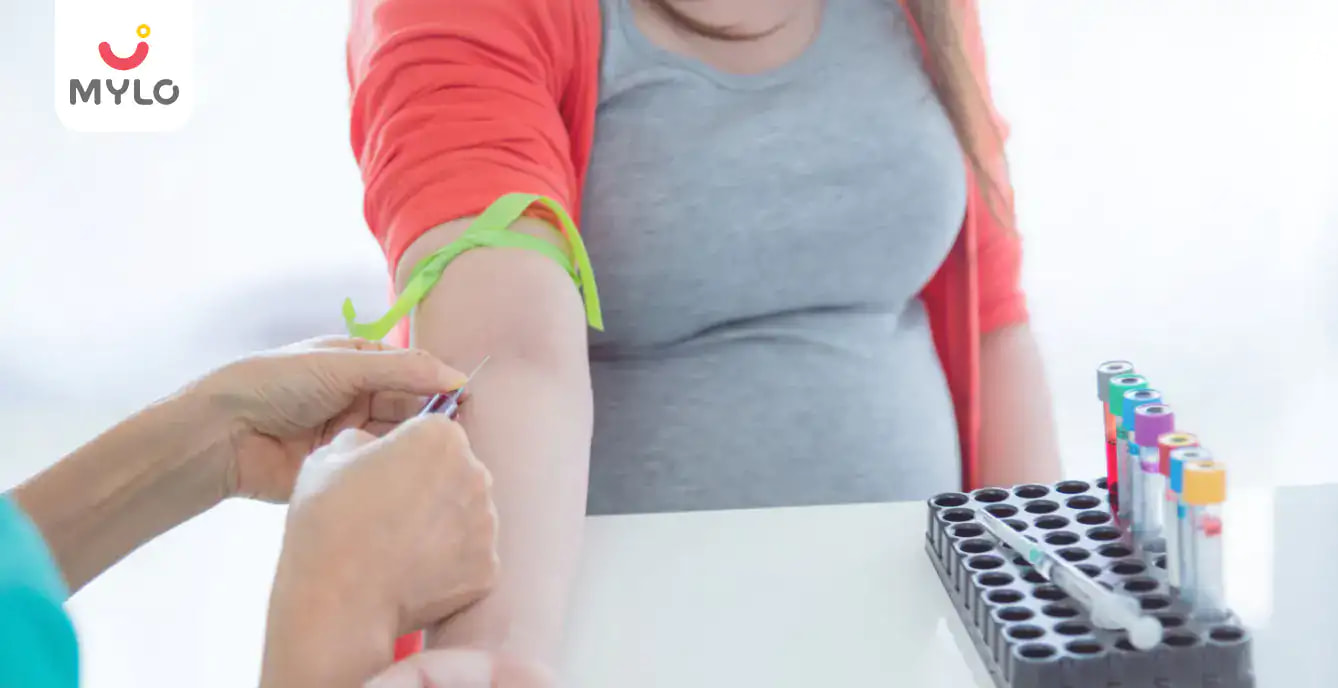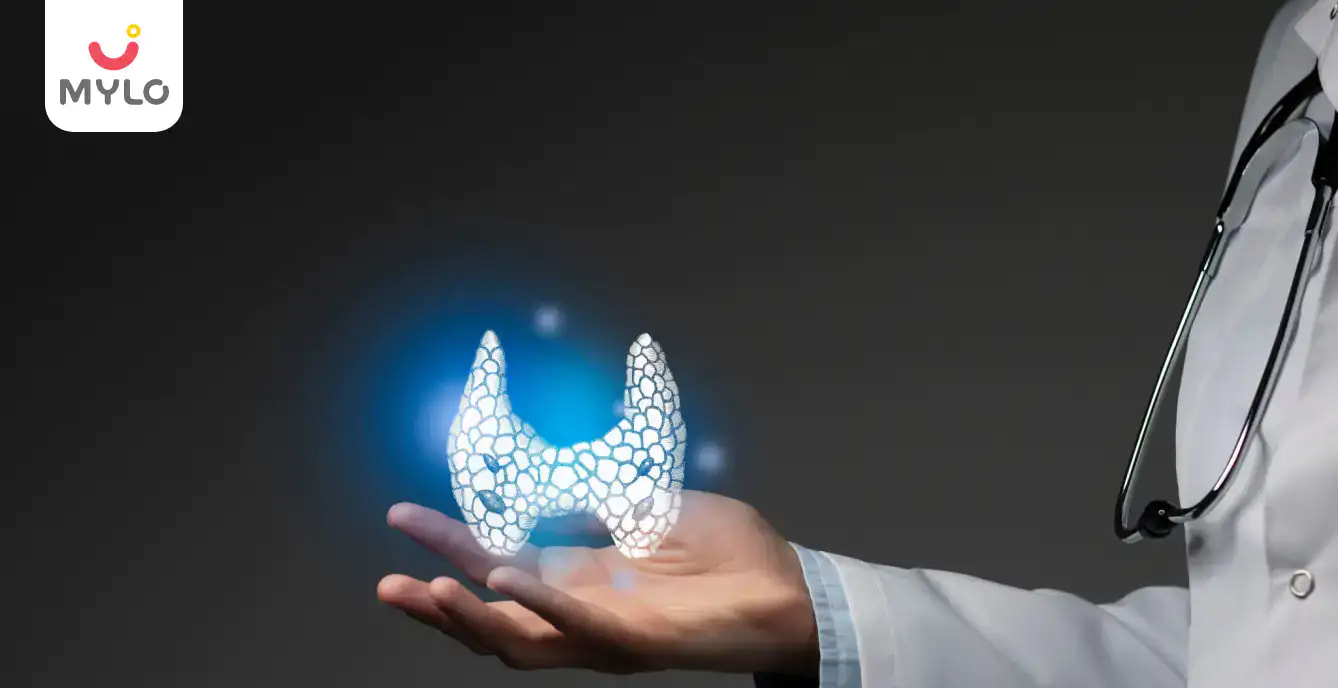Home

Scans & Tests

How often should you check thyroid levels during pregnancy?
In this Article

Scans & Tests
How often should you check thyroid levels during pregnancy?
Updated on 3 November 2023
Introduction
Pregnancy is considered one of the most beautiful phases of a woman's life. Yet there are a lot of changes you must be ready to experience pre and postpartum. The majority of the changes you see in your body result from hormonal activities. The thyroid gland is one of the major glands that regulate the hormonal activity in your body. The thyroid gland produces thyroid hormones, which are shaped like a little butterfly on the front of your neck. Thyroid hormones control how your body uses energy and affect almost every organ in your body, including the rate at which your heart beats. Thyroid hormones are also essential for your baby's brain and nervous system to develop normally. Therefore, you must monitor your thyroid health during pregnancy and know how often to check thyroid levels during pregnancy.
Pregnancy and thyroid activity
In some women, the thyroid is overstimulated during pregnancy. This results in alterations in thyroid hormone concentrations. When this increases, this condition is known as hyperthyroidism. The thyroid gland is understimulated during pregnancy in a different group of women. This also alters the thyroid hormone concentrations. The difference here is that the thyroid hormone concentration is decreased. This condition of reduced thyroid activity is called hypothyroidism. Both hyperthyroidism and hypothyroidism are unfavourable conditions. It is, therefore, important that you understand these two conditions and monitor your thyroid activity at the right intervals. Hence, you are aware of how to keep yourself and your child healthy during and after your pregnancy.
Hypothyroidism during pregnancy
Compared to hyperthyroidism, pregnant hypothyroidism has a higher prevalence (2.5%) and can result in neonatal and infant cognitive abnormalities and maternal obstetric problems. Hypothyroidism during pregnancy manifests as extreme tiredness, inability to cope with cold conditions, muscle cramping, severe cases of constipation, and difficulties with memory and the ability to concentrate on things. In some cases, hypothyroidism is mild and might not display external symptoms during pregnancy. The cause of hypothyroidism during pregnancy is often an autoimmune condition known as Hashimoto's disease, and 2 or 3 out of any random hundred pregnant women could be affected. If you have Hashimoto's disease, your immune system attacks the thyroid, which results in inflammation and damage that impairs the thyroid's ability to produce thyroid hormones.
Effects of hypothyroidism on you & your child
Hypothyroidism could have the following effects on you and your child if left untreated:
1. Stillbirth
Your child’s life may be lost during delivery or after twenty-four weeks of your pregnancy
2. Miscarriage
You may lose your fetus before the 20th week of your pregnancy.
3. Anaemia
Anaemia is a condition in which there is a deficiency of healthy red blood cells in your blood. These cells are essential for oxygen to reach all parts of your body.
4. Congestive heart failure
It is a heart failure condition in which your heart loses pumping power. This results in fluid building up in your body. However, this condition is rare.
5. Low birth weight
Your child might not have sufficient weight at birth and might require additional support and supplements.
6. Preeclampsia
It is a dangerous condition in which your blood pressure may rise to unhealthy levels in the late stages of your pregnancy.
7. IQ and developmental issues
The thyroid hormones are very crucial for your baby's nervous system development and brain. Furthermore, untreated hypothyroidism, particularly in the first trimester, can result in a low IQ and developmental issues.
Hyperthyroidism after pregnancy/during pregnancy: Hyperthyroidism during pregnancy is not very common. In normal pregnancies, some signs of hyperthyroidism, such as tiredness, a faster heart rate, and difficulty adjusting to the heat. Some other symptoms of hyperthyroidism that you have to look out for are: Irregularities in your heartbeat, trembling or shaking in your hands, weight loss that is unexplained, or not experiencing normal pregnancy weight gain. Graves' disease is the most common cause of hyperthyroidism in pregnancy. Graves' disease is an autoimmune disease that affects the body's immune system. Your immune system produces antibodies that cause the thyroid to produce too much thyroid hormone due to this condition. Untreated hyperthyroidism could lead to the following situations or conditions:
- Miscarriage
- Premature birth: Your child could be born before the completion of your normal gestational period, before attaining full or the necessary growth.
- Low birthweight
- Preeclampsia
- Congestive heart failure
- Hyperthyroidism in the baby: The antibody responsible for this condition may travel into your child’s bloodstream and lead to hyperthyroidism in your child as well.
You may also like: How to check pulse rate during pregnancy? (mylofamily.com)
When to check thyroid levels during pregnancy?
On a concluding note, you must monitor your thyroid levels during pregnancy. Depending on your condition, the frequency changes. If you have hypothyroidism, thyroid blood tests should be done every four to six weeks during pregnancy. If you have hyperthyroidism, you have to undergo tests every four weeks or at a frequency set by your endocrinologist. We hope that this article's information helped you know when to check thyroid levels after pregnancy and how often to check thyroid levels during pregnancy.
References
- Offie P. Soldin. (2006). Thyroid Function Testing in Pregnancy and Thyroid Disease.
- Barbour, L. (2017). Thyroid Disease & Pregnancy.
Trending Articles
When To Test For Pregnancy After Missed Period | Maximum How Many Days To Confirm Pregnancy | How To Have Sex Without Getting Pregnant | What Can I Take For Diarrhea While Pregnant



Written by
Priyanka Verma
Priyanka is an experienced editor & content writer with great attention to detail. Mother to an 11-year-old, she's a ski
Read MoreGet baby's diet chart, and growth tips

Related Articles
RECENTLY PUBLISHED ARTICLES
our most recent articles

Diet & Nutrition
গর্ভাবস্থায় আলুবোখরা: উপকারিতা ও ঝুঁকি | Prunes During Pregnancy: Benefits & Risks in Bengali

Diet & Nutrition
গর্ভাবস্থায় হিং | ঝুঁকি, সুবিধা এবং অন্যান্য চিকিৎসা | Hing During Pregnancy | Risks, Benefits & Other Treatments in Bengali

Women Specific Issues
স্তনের উপর সাদা দাগ: লক্ষণ, কারণ এবং চিকিৎসা | White Spots on Nipple: Causes, Symptoms, and Treatments in Bengali

Diet & Nutrition
গর্ভাবস্থায় পোহা: উপকারিতা, ধরণ এবং রেসিপি | Poha During Pregnancy: Benefits, Types & Recipes in Bengali

Diet & Nutrition
গর্ভাবস্থায় মাছ: উপকারিতা এবং ঝুঁকি | Fish In Pregnancy: Benefits and Risks in Bengali

Diet & Nutrition
গর্ভাবস্থায় রেড ওয়াইন: পার্শ্ব প্রতিক্রিয়া এবং নির্দেশিকা | Red Wine During Pregnancy: Side Effects & Guidelines in Bengali
- ইনার থাই চ্যাফিং: কারণ, উপসর্গ এবং চিকিৎসা | Inner Thigh Chafing: Causes, Symptoms & Treatment in Bengali
- গর্ভাবস্থায় ব্রাউন রাইস: উপকারিতা ও সতর্কতা | Brown Rice During Pregnancy: Benefits & Precautions in Bengali
- Velamentous Cord Insertion - Precautions, Results & Safety
- Unlock the Secret to Flawless Skin: 7 Must-Have Qualities in a Face Serum
- Unlock the Secret to Radiant Skin: How Vitamin C Serum Can Transform Your Complexion
- Gender No Bar: 10 Reasons Why Everyone Needs a Body Lotion
- Unlock the Secret to Radiant Skin How to Choose the Perfect Body Lotion for Your Skin Type
- Top 10 Reasons to Apply a Body Lotion After Every Bath
- Communication in Toddlers: Milestones & Activities
- How to Improve Vocabulary for Toddlers?
- A Comprehensive Guide to Understanding Placenta Accreta
- Vulvovaginitis in Toddlers Causes, Symptoms and Treatment
- A Comprehensive Guide to Understanding Cerebral Palsy in Children
- Bitter Taste in Mouth During Pregnancy: Understanding the Causes and Remedies


AWARDS AND RECOGNITION

Mylo wins Forbes D2C Disruptor award

Mylo wins The Economic Times Promising Brands 2022
AS SEEN IN

- Mylo Care: Effective and science-backed personal care and wellness solutions for a joyful you.
- Mylo Baby: Science-backed, gentle and effective personal care & hygiene range for your little one.
- Mylo Community: Trusted and empathetic community of 10mn+ parents and experts.
Product Categories
baby carrier | baby soap | baby wipes | stretch marks cream | baby cream | baby shampoo | baby massage oil | baby hair oil | stretch marks oil | baby body wash | baby powder | baby lotion | diaper rash cream | newborn diapers | teether | baby kajal | baby diapers | cloth diapers |








